11 Healthiest Nuts To Eat According to a Nutritionist in 2026
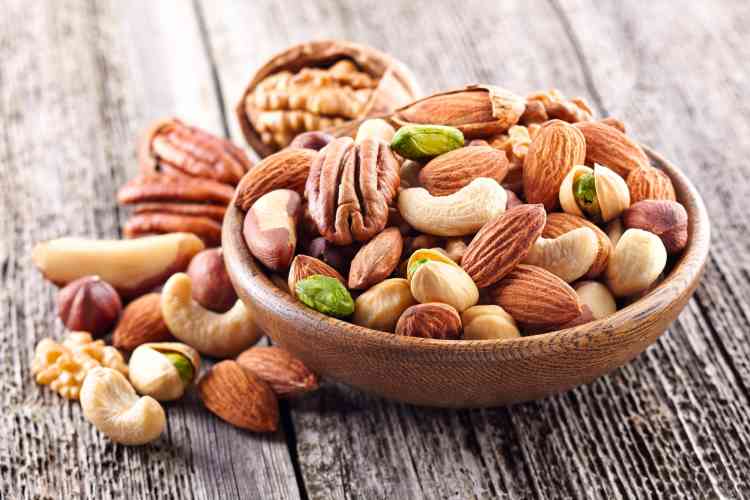
Are you looking for the healthiest nuts to add extra nutrients to your diet? If so, you'll be pleased to learn there are many nutrient-dense types to go for. But which ones should you eat more of? And what are the health benefits associated with nuts?
Nuts are a good source of plant-based protein and contain a decent amount of fiber, resulting in them being one of the healthiest snacks available. Nuts are also an excellent source of vitamins and minerals, including vitamin E and B6, magnesium and zinc.
They are also heart-healthy and high in healthy fats. The Nurses' Health Study states that frequent consumption of nuts — generally considered to be around four to six servings of unsalted nuts per week — has been associated with a lower risk of coronary heart disease in women (with similar results in other studies, such as the Adventist Health Study, being seen for men).
However, data suggest many Americans don't include unsalted nuts (including peanuts) in their diet. If you have been part of that group, but want to add more nuts to your diet to reap their health benefits, which should you go for?
To help you discover the best types, we’ve rounded up the 11 healthiest nuts, all of which can likely be found at your local grocery store and are nutritionist-approved as being a healthy addition to your diet. Whatever health goals you are trying to reach, there is a nut to help you along your journey!
Jump to Section
- The 11 Most Healthy Nuts To Eat
- What Is the Healthiest Nut?
- What Is a Healthy Serving of Nuts?
- How We Choose the Healthiest Nuts
The 11 Most Healthy Nuts To Eat
1. Almonds
Almonds are among the most popular nuts worldwide and are often called a superfood. They’re rich in vitamin E, which supports skin and eye health, making them one of the best nuts to eat if you want a nutrient-dense snack.
As WebMD confirms, not only are almonds high in vitamin E, but eating these healthy nuts may also help reduce your risk of heart disease and obesity. Almonds are additionally a good source of magnesium and a great option if you’re looking for high-protein snacks, as they have one of the highest protein counts among all nuts at around 6 grams of protein per ounce.
A 1-ounce serving has about 14 grams of fat, mostly unsaturated. In a small daily portion, this fits well in a healthy, balanced diet.
How To Use Almonds
Along with being a delicious snack on their own, almonds can be used in a variety of dishes, including in recipes you may not think work with almonds, like dragon fruit smoothies.
If you want a treat that’s still quite healthy and incorporates this nut, almonds go perfectly with healthy dark chocolate in minimal ingredient recipes like chocolate-covered almonds or chocolate almond bark.
Almond Nutritional Information
Average per one-ounce or 28-gram serving
- Calories: 164
- Total Fat: 14.2 grams
- Saturated Fat: 1 gram
- Protein: 6 grams
- Carbohydrates: 6.1 grams
- Dietary Fiber: 3.5 grams
- Sugars: 1.2 grams
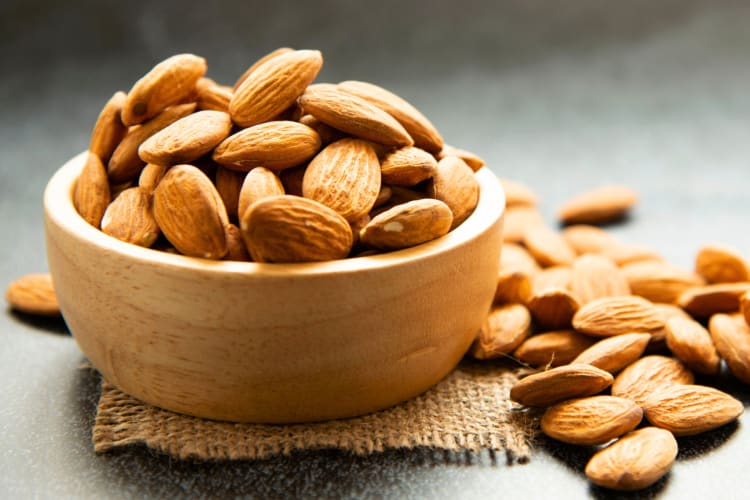
2. Pistachios
Pistachios are a tasty, healthy snack with a high amount of protein and fiber. This healthy nut also has a high amount of potassium. Other benefits of pistachios include that they may help support healthy blood pressure and cholesterol levels and promote eye health.
Again, this nut does have quite a high fat content, but snacking on pistachios in moderation is fine as part of a balanced diet. Also, note that many pistachios are sold salted, so keep this in mind and check labels if you are looking to lower your salt intake.
How To Use Pistachios
One of the best ways to eat pistachios is simply snacking on them as is. However, they could also be sprinkled over salads, used in place of pine nuts in a pesto or made into a tasty pistachio latte as a treat.
Pistachio Nutritional Information
Average per one-ounce or 28-gram serving
- Calories: 165
- Total Fat: 13.4 grams
- Saturated Fat: 1.5 grams
- Protein: 5.8 grams
- Carbohydrates: 7.8 grams
- Dietary Fiber: 2.8 grams
- Sugars: 2.1 grams
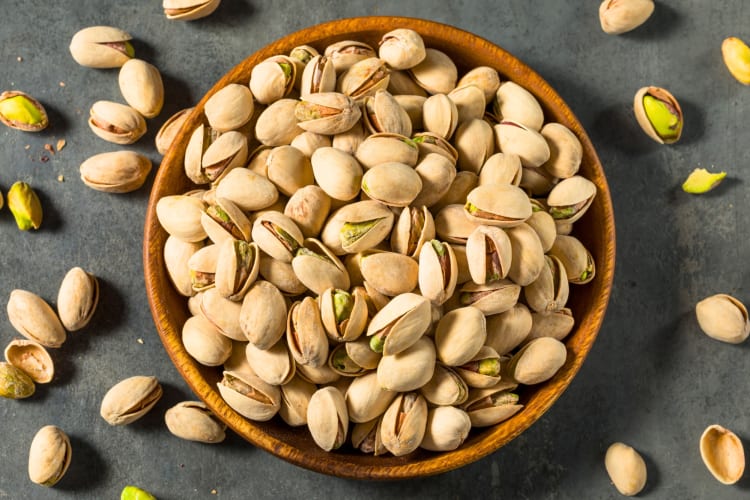
3. Walnuts
Walnuts are among the healthiest nuts for heart health. They provide omega-3s in the form of ALA, and as Cleveland Clinic explains, your body only converts a small amount of ALA into the fish-type omega-3s EPA and DHA, so fish remains the most direct source of EPA and DHA. Even so, this healthy nut delivers unsaturated fats, fiber and polyphenols that are linked with improved heart health markers.
One potential drawback is that walnuts only have around 4 to 5 grams of protein per ounce as opposed to some other healthy nuts on this list, which have closer to 6 to 7 grams per ounce. However, they are still one of the higher protein nuts, and a solid choice to keep in your rotation.
How To Use Walnuts
Walnuts can be added to various dishes if you don’t want to eat them on their own. Stir them into the healthiest granola, sprinkle them on yogurt or add them to tasty date bars for a healthy homemade snack.
They also work well in savory recipes like walnut pesto or honey walnut shrimp and can be added to a range of salads — the options are endless!
Walnut Nutritional Information
Average per one-ounce or 28-gram serving
- Calories: 183
- Total Fat: 18 grams
- Saturated Fat: 2 grams
- Protein: 4.3 grams
- Carbohydrates: 3.8 grams
- Dietary Fiber: 2 grams
- Sugars: 0.7 grams

4. Cashews
Cashews have a luxuriously creamy texture that, despite being some of the healthiest nuts, makes them taste decadent and satisfying. While these nuts are undoubtedly tasty, are cashews good for you? These curved treats are, in fact, some of the healthiest nuts because of their vitamin and nutrient values.
As Medical News Today highlights, 1 ounce of cashews provides 9.1% of your daily iron and 14% of your daily zinc. This serving size also provides 17% of your daily magnesium, which is essential for healthy nerves, bones, muscles and blood sugar levels. Cashews also contain vitamin K and around 4 to 5 grams of protein per ounce.
Cashews are higher in saturated fat than almonds or pistachios, so moderation matters. Like with pistachios, do be careful when purchasing cashews at the store, as they are often sold salted and/or with other flavorings and added oils.
How To Use Cashews
As mentioned, seasoned cashews sold at stores aren't always healthy. If you want to add a little extra flavor, doing so at home is a great idea to keep an eye on what ingredients are used, for example, by making some flavorful honey-roasted cashews.
Along with being a delicious snack, cashews are versatile nuts for cooking with, especially when added to Asian-inspired dishes like stir-fries or noodle recipes.
Cashew Nutritional Information
Average per one-ounce or 28-gram serving
- Calories: 157
- Total Fat: 12 grams
- Saturated Fat: 2.5 grams
- Protein: 5.2 grams
- Carbohydrates: 8.6 grams
- Dietary Fiber: 1 gram
- Sugars: 1.7 grams

5. Pecans
Pecans are a staple nut in the U.S. and popular in sweet and savory dishes. They can be among the healthiest nuts, offering heart-healthy monounsaturated fats, fiber and antioxidant polyphenols.
While they provide some zinc, pecans are better known for manganese and thiamin. This nutrient profile supports a heart-healthy eating pattern and may help reduce oxidative stress.
Pecans are calorie-dense and do have a little less protein per ounce than some other healthy types of nuts. However, they are still well worth incorporating into your snacking routine as long as enjoyed in moderation.
How To Use Pecans
In terms of how to eat them other than enjoying a handful on their own, these healthy nuts can be added to homemade gluten-free granola or used in savory recipes like pecan-crusted chicken, among many other options.
Pecan Nutritional Information
Average per one-ounce or 28-gram serving
- Calories: 196
- Total Fat: 20 grams
- Saturated Fat: 2 grams
- Protein: 2.6 grams
- Carbohydrates: 4 grams
- Dietary Fiber: 2.7 grams
- Sugars: 1 gram

6. Macadamia Nuts
Macadamia nuts are a tropical nut with a buttery yet mild flavor. These nuts were originally from Australia, but most of the world's macadamia nuts today are grown in Hawaii, with Costa Rica, New Zealand and Brazil also being producers of these healthy nuts.
These are some of the healthiest nuts for those on low-carb diets because they have a lower carb count than many other healthy types of nuts. Studies, such as those published via the National Library of Medicine, also show that eating macadamia nuts helps lower LDL cholesterol (often referred to as "bad" cholesterol) and supports a healthy cardiovascular system.
Macadamia nuts are also rich in manganese and thiamine, have a decent amount of fiber and, due to being low in carbs and sugar, shouldn't spike blood sugar levels.
How To Use Macadamia Nuts
Macadamia nuts are delicious eaten as is. They're also tasty when dipped in a high-quality chocolate.
These nuts can additionally be used in a variety of recipes, including macadamia nut butter. This healthy nut butter can be used on toast, in smoothies and more.
Macadamia Nut Nutritional Information
Average per one-ounce or 28-gram serving
- Calories: 204
- Total Fat: 21.6 grams
- Saturated Fat: 3 grams
- Protein: 2.2 grams
- Carbohydrates: 3.8 grams
- Dietary Fiber: 2.3 grams
- Sugars: 1.2 grams
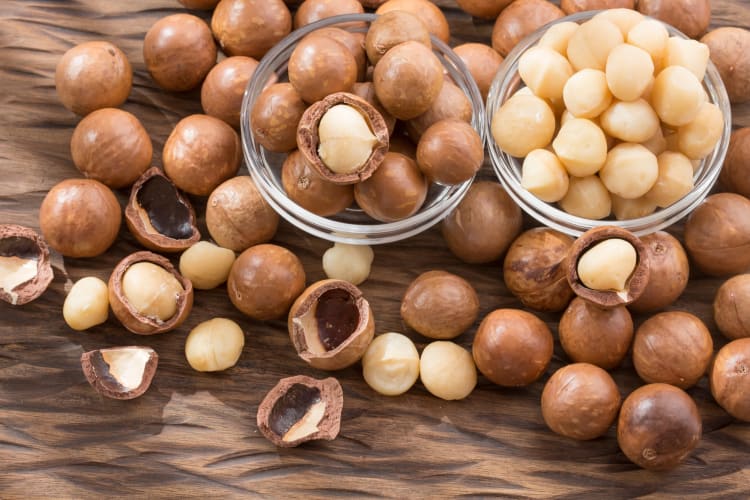
7. Brazil Nuts
As you may have guessed from their namesake, Brazil nuts are from countries in the Amazon Rainforest, including Brazil. These nuts have a hearty, satisfying flavor and are one of the healthiest nuts due to their high selenium content.
As WebMD notes, selenium supports thyroid function, cognitive and reproductive health, and normal immune defenses. It is worth noting that experts recommend never consuming more than 400 micrograms of selenium per day, with the optimal amount for an adult being 55 micrograms per day.
As one Brazil nut has around 95 micrograms, watch how many you eat to avoid consuming too much selenium, especially if you have eaten other sources during the day, such as lean meats, seafood or pasta. Brazil nuts are also quite high in fat; another reason why portion control is especially important with this healthy nut.
How To Use Brazil Nuts
If you portion them correctly, Brazil nuts are delicious to eat raw as a snack, and they can also be used in tasty treats like Brazil nut banana bread. As with almonds and macadamia nuts, coating Brazil nuts in high-quality dark chocolate is a great idea for an indulgent yet still quite healthy treat.
Brazil Nut Nutritional Information
Average per one-ounce or 28-gram serving
- Calories: 187
- Total Fat: 19 grams
- Saturated Fat: 4.5 grams
- Protein: 4 grams
- Carbohydrates: 3.3 grams
- Dietary Fiber: 2 grams
- Sugars: 0.7 grams
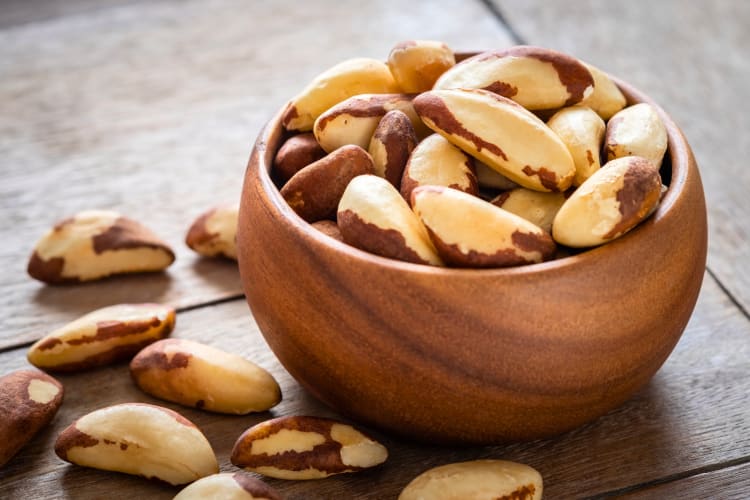
8. Hazelnuts
Hazelnuts are small, round nuts best known from chocolate-hazelnut spreads. These petite treats are some of the healthiest nuts because they are packed with essential vitamins and minerals.
One notable nutrient in this healthy nut is manganese. Think of manganese as a helper mineral that supports strong bones, steady energy and normal wound healing, as The Nutrition Source notes. Hazelnuts also provide about 4 grams of protein and roughly 3 grams of fiber per ounce, which can help you stay full between meals.
How To Use Hazelnuts
The primary way many people enjoy hazelnuts is in Nutella. And, while chocolate hazelnut spreads are not the healthiest options out there, including hazelnuts in your breakfast in other ways is a great idea.
For example, sprinkle them over healthy Greek yogurt or add them to a homemade granola. For something a little different, soak them overnight, blend and strain for a delicious homemade plant-based milk.
You can also use them with high-quality cocoa and a natural sweetener to make a hazelnut chocolate spread at home that can be enjoyed by adults or served as a healthy snack for kids.
Hazelnuts Nutritional Information
Average per one-ounce or 28-gram serving
- Calories: 178
- Total Fat: 17 grams
- Saturated Fat: 1.5 grams
- Protein: 4.2 grams
- Carbohydrates: 4.7 grams
- Dietary Fiber: 2.8 grams
- Sugars: 1.2 grams
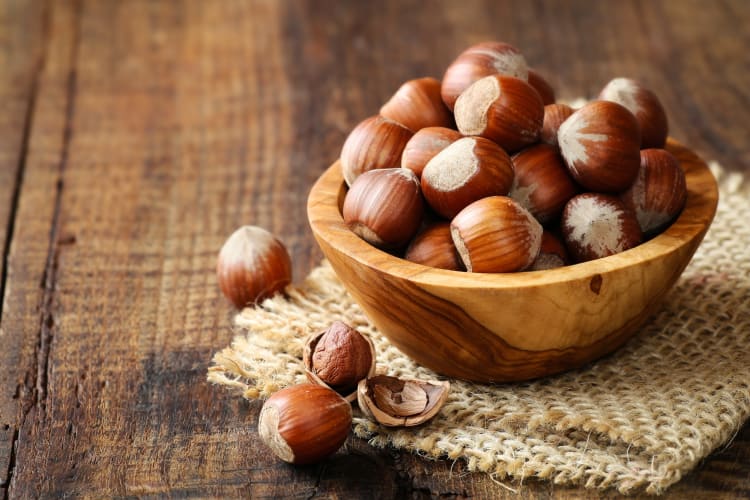
9. Peanuts
While technically a legume, peanuts have a nutritional profile similar to nuts and still belong on this list of the healthiest nuts. This popular snack delivers about 7 grams of protein per ounce and provides folate, fiber and antioxidants.
As Mayo Clinic explains, folate supports red blood cell production and healthy cell growth, especially in early pregnancy. Peanuts also contain resveratrol, the same antioxidant found in red grapes, which adds to this healthy nut’s appeal.
Peanut allergy is more common than many tree nut allergies, so those with a history of food allergies or introducing peanuts to children should follow medical guidance.
How To Use Peanuts
One of the best things about these healthy nuts is that they can be used in an endless number of recipes, along with being a great snack.
Ways to add peanuts to your daily meals include sprinkling them over Asian-style dishes, especially Thai food, like Thai papaya salad, as well as stir-fries and noodle dishes, and eating them as peanut butter with the likes of wholegrain toast, bananas, apples or healthy crackers.
Just remember to opt for the healthiest peanut butter at the store with minimal ingredients, ideally, only peanuts and a bit of salt. Or, try making your own natural peanut butter at home.
If you prefer them as a snack, you could also make some honey-roasted peanuts. More tasty peanut recipes to make in your own kitchen include peanut sauce with rice paper summer rolls and vegetarian pad thai with a chopped peanut garnish.
Peanuts Nutritional Information
Average per one-ounce or 28-gram serving
- Calories: 161
- Total Fat: 14 grams
- Saturated Fat: 2 grams
- Protein: 7.3 grams
- Carbohydrates: 4.6 grams
- Dietary Fiber: 2.4 grams
- Sugars: 1.3 grams
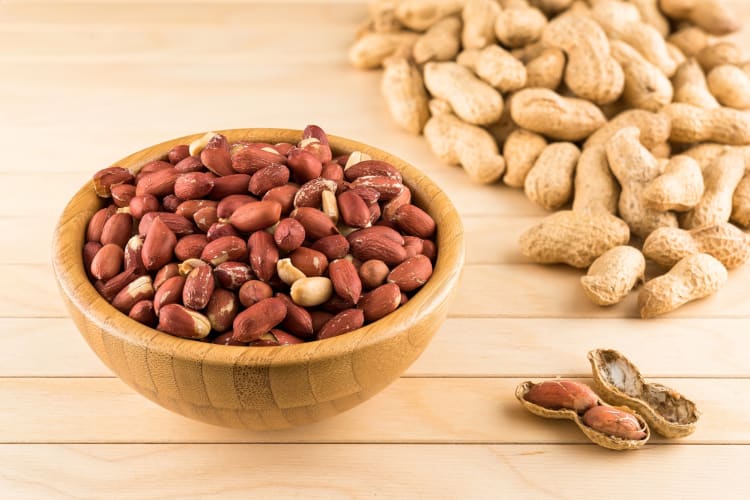
10. Chestnuts
Chestnuts are a popular nut grown on many continents across the globe. While often associated with the holidays, you can generally find them in the grocery store all year.
Unlike most of the healthiest nuts, chestnuts are nutritionally distinct as they are very low in fat and protein and are mostly carbohydrate. Think of this healthy nut more like a starchy food than a fat-rich nut.
That makes chestnuts a fit for low-fat diets, but they don’t offer the protein or unsaturated fats found in other healthiest nuts. For balance, pair roasted chestnuts with a lean protein such as chicken or a healthy fat like olive oil.
How To Use Chestnuts
Chestnuts may seem a little more challenging to incorporate into your daily diet; however, they work great sautéed with Brussels sprouts and can be enjoyed roasted as a snack. Interestingly, you can also use them in pâté, stews and other winter dishes.
Chestnuts Nutritional Information
Average per one-ounce or 28-gram serving
- Calories: 88
- Total Fat: 1 gram
- Saturated Fat: 0 grams
- Protein: 1 gram
- Carbohydrates: 19 grams
- Dietary Fiber: 2 grams
- Sugars: 4 grams
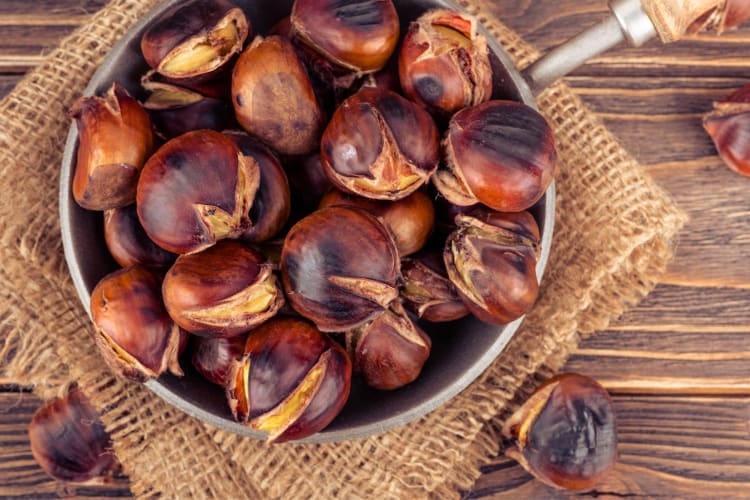
11. Pine Nuts
Contrary to popular belief, pine nuts aren’t actually nuts but seeds. They are derived from the pine cone family and are still nutritious even though they technically aren’t nuts.
Pine nuts are high in potassium and may support healthy blood sugar control. In common with most of the healthiest types of nuts, pine nuts are good for brain and heart health, thanks to the antioxidants and omega-3 fatty acids they contain.
These healthy nuts are additionally low in carbs and have around 3 to 4 grams of protein per 1-ounce serving. They are a little high in calories, though, so eat them in moderation.
How To Use Pine Nuts
Along with having many health benefits, pine nuts have a lot of uses. This includes being a main ingredient in pesto and vegan pesto, and working perfectly sprinkled over salads like lemon kale salad, pepper salad or wilted spinach salad.
While not an overly healthy option, you can also add them to desserts like Italian pignoli, a pine nut cookie.
Pine Nuts Nutritional Information
Average per one-ounce or 28-gram serving
- Calories: 191
- Total Fat: 19 grams
- Saturated Fat: 1.5 grams
- Protein: 3.9 grams
- Carbohydrates: 3.7 grams
- Dietary Fiber: 1.1 grams
- Sugars: 1 gram
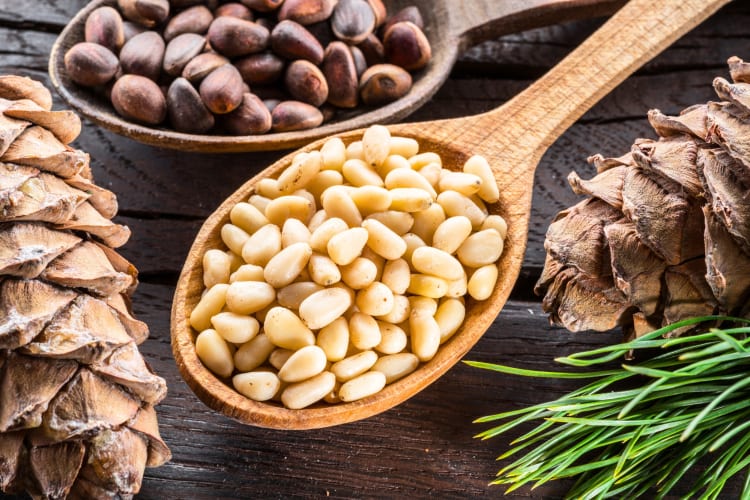
What Is the Healthiest Nut?
If you're curious about how to start eating healthy, adding nuts to your diet is a great jumping-off point. In general, nuts have healthy fats, protein and fiber, plus many vitamins and minerals. Most nuts contain primarily unsaturated fats (monounsaturated and polyunsaturated), which support cardiovascular health, versus saturated fats, which should be limited.
Finding the healthiest nut ultimately depends on your specific health concerns and dietary goals. For example, if you want to incorporate more protein in your diet, peanuts (even though technically a legume) and almonds are the healthiest nuts to opt for.
Alternatively, if you’re looking for plant-based omega-3 sources, walnuts are a good choice. Those searching for the best nuts to eat on a low-calorie diet will want to go with chestnuts, followed by cashews. Those who want to find the healthiest nuts to boost dietary fiber intake should turn to almonds, pistachios and hazelnuts.
To find the best nuts to eat for different dietary needs, the following guide can be used, with all values relating to a 1-ounce/28-gram serving size:
Lowest Calorie Nuts
- Chestnuts: 88 calories
- Cashews: 157 calories
Nuts With the Lowest Total Fat
- Chestnuts: 1 gram
- Cashews: 12 grams
Highest Protein Nuts
- Peanuts: 7.3 grams
- Almonds: 6 grams
Nuts With the Most Fiber
- Almonds: 3.5 grams
- Pistachios: 2.8 grams
- Hazelnuts: 2.8 grams
Lowest Carbohydrate Nuts
- Brazil Nuts: 3.3 grams
- Pine Nuts: 3.7 grams
However, as the healthiest nuts all have similar nutritional profiles, choosing your favorites based on taste alone is acceptable as well! Adding a range of different types of healthy nuts to your diet also allows you to get a variety of vitamins and nutrients, while keeping things interesting.
While nuts are a great healthy addition to your diet, remember to enjoy them in moderation, as they’re calorie-dense foods. Choosing unsalted and unseasoned versions where possible helps keep your snack both heart-healthy and nutrient-rich.
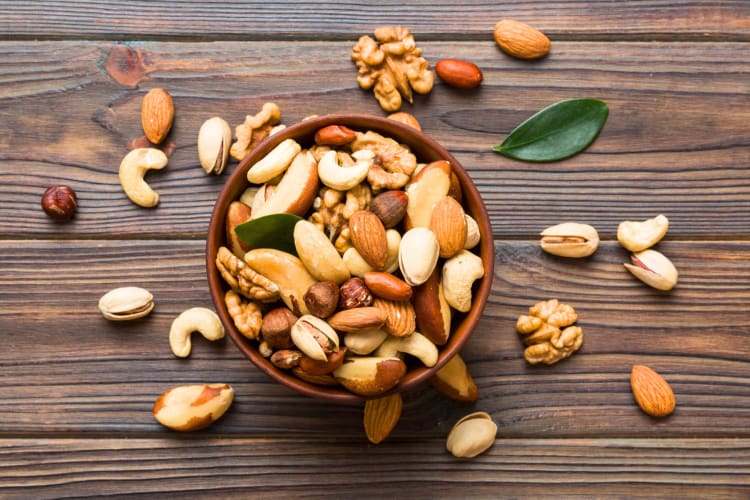
What Is a Healthy Serving of Nuts?
Nuts are healthy for you, packed with nutrients and heart-healthy fats, though they’re also quite calorie-dense. Being mindful of portions helps you enjoy their benefits as part of a balanced diet.
According to the American Heart Association, a healthy serving of nuts is about a small handful or 1 ounce of whole nuts, or 2 tablespoons of nut butter. While this can vary slightly depending on the type of healthy nut, this amount is generally considered optimal for supporting heart health and maintaining a balanced calorie intake.
For easy portion visuals, 1 ounce equals roughly: 23 almonds, 18 cashews, 14 walnut halves, 19 pecan halves, 49 pistachios and about 28 peanuts. These serving sizes relate to unsalted raw or dry-roasted nuts and minimal-ingredient nut butters. Salted nuts and those cooked in oils should be treated as occasional extras, if at all.
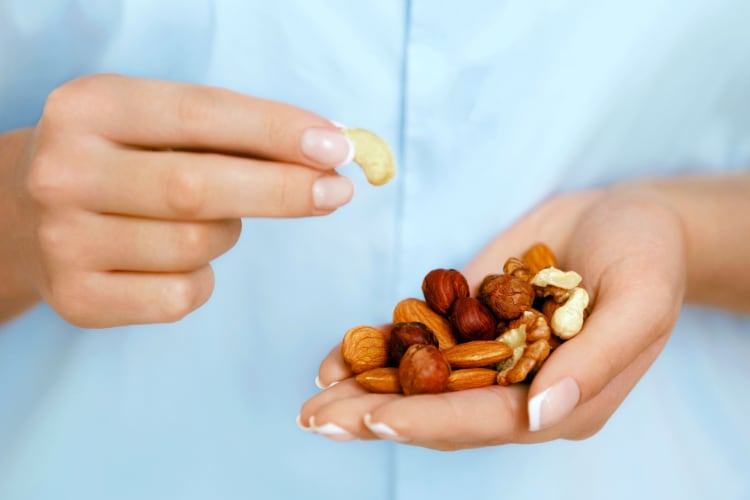
How We Choose the Healthiest Nuts
At Cozymeal, we're passionate about connecting our audience with culinary experiences and content, including articles that focus on nutrition topics, such as the healthiest foods to eat.
These nutrition guides are created via in-depth research. They are also reviewed by Jessica O'Shea, a Registered Nutritionist (ANutr) with the Association for Nutrition. This process results in content that’s factually accurate, valuable and informative.
For this specific guide to the healthiest nuts, we followed this same process: researching the healthiest nuts based on nutritional profile and health benefits offered, and having the content nutritionist-reviewed to ensure we only recommend the healthiest choices.
This list of the healthiest nuts to eat also features full nutritional profiles for each nut, and we even offer some tips on how to incorporate them into your diet. We additionally highlight which types of nuts are best for common dietary goals, such as the lowest-calorie and highest-protein nuts, allowing you to find the healthiest nuts to eat to meet your health goals.
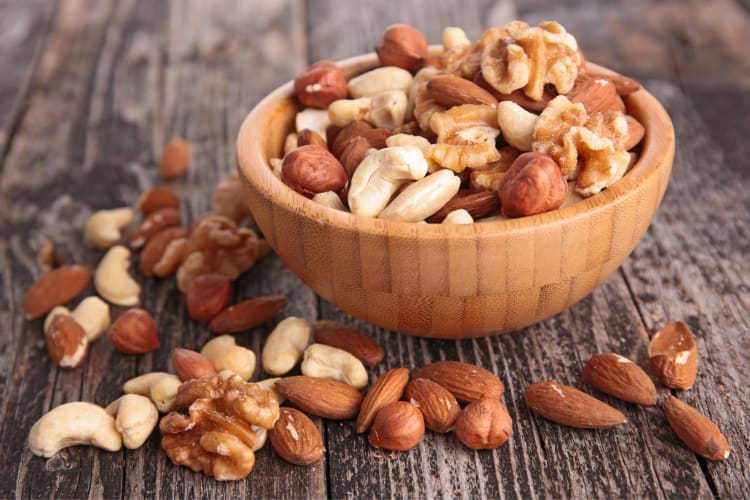
If you’ve been wondering what the healthiest nuts are, this guide should have given you the answer, including covering which nuts are best for which dietary needs.
No matter which types you go for, incorporating nuts into your daily meals can have a lasting impact on your health and wellness. For best results, mix and match the healthiest nuts featured on this list to get a mix of nutrients and keep your meals and snacks interesting.
For even more ways to explore your favorite foods, check out other experiences happening on Cozymeal.
